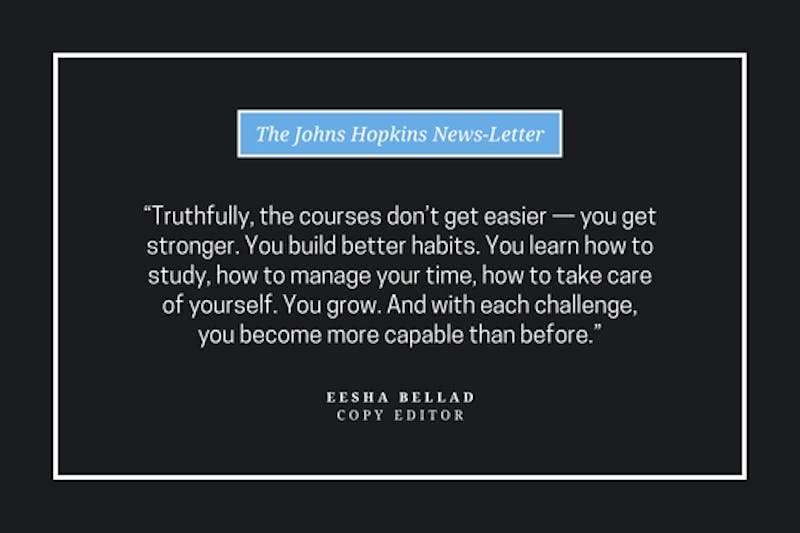

Freshman year at Hopkins: something I’d dreamed of saying all throughout high school. When it finally became real, I was thrilled: ready to dive into challenging classes, live in a dorm and experience college in the way I’d always imagined. But after a tough first week, things didn’t get easier. Week after week, I found myself struggling, more than I ever expected.
I’m not saying this to scare you, but to reassure you — if your transition into Hopkins isn’t perfect, you're not alone. This isn’t a “studying 101” manual, it’s a collection of honest reflections and tips to help you feel just a little more prepared for the journey ahead.
1. Work efficiently.
One of the most jarring differences between high school and college is the depth and intensity of the coursework. The first step is simply being aware of that shift. It’s easy to get caught off guard if you assume that the same study habits you’ve used for the past decade will carry you through. For many of us, they don’t.
When the workload ramps up, your first instinct might be to just “study more.” I fell into that trap, too. But it’s not always about how much time you spend studying. Often, it’s about how you’re studying. Efficient, evidence-based methods like active recall and spaced repetition can help you learn more in less time and with deeper understanding. For example, instead of rewriting your notes over and over, try blurting, where you write down everything you remember about a topic without looking, then using your resources to notate the information you couldn’t recollect.
2. Be honest with yourself.
When you go to study with a big group of people, ask yourself: “Am I actually getting work done?” Sometimes the answer is yes! But other times… not so much. Realistically, it turns into mostly chatter. Or maybe they’re racing ahead in the material, and instead of focusing, you start spiraling and feeling behind.
Ask yourself: Would I be more productive studying alone right now?
If the answer is yes, then great! There are plenty of spots around campus where you can focus without distractions. You’re isolating yourself; you’re being intentional with your time.
And sometimes the answer is no, and that’s okay too. Maybe it's the end of a long day, your brain’s fried, and you’re not getting much done either way. In that case, it might be worth spending time with friends, doing lighter work, and recharging a bit.
A helpful strategy? Check in with your friends ahead of time. Ask: “Is this a quiet focus session or more of a chill study hangout?” You don’t need them to change anything, just figure out if it’s the right fit for you that day.
3. Get HELP.
One of the most valuable lessons I learned early on in college was how to ask for help. One of my favorite things about Hopkins is how accessible support is. I was in office hours almost every single day, and honestly, that’s where I learned most of my material. I’m so grateful for that. But beyond the direct help from professors and TAs, office hours also gave me the chance to meet other students who were struggling with the same things, or students who had already figured it out and were happy to explain.
Asking for help doesn’t just mean going to office hours either. It can look like talking to someone a year or two ahead of you, friends, mentors, even classmates. They might share their notes, recommend (or warn you about) certain professors, or give you advice against specific course combinations. Sometimes just hearing that a class was hard for them too can make you feel less alone.
The bottom line: There is no shame in asking for help. In fact, it’s one of the smartest things you can do.
Every failure, every setback, is shaping you into someone tougher, wiser, and more resilient. That being said, know your limits. It is completely okay to drop a class. You are allowed to have a lighter course load. You are not weak for needing a break. You are wise for recognizing what you need to succeed. You’re not alone in struggling with schoolwork during your first year, even if it feels like everyone else has it all together. The truth is, people don’t always show what they’re going through.
College is hard. And freshman year classes, despite what anyone says, don’t exactly ease you in. Truthfully, the courses don’t get easier — you get stronger. You build better habits. You learn how to study, how to manage your time, how to take care of yourself. You grow. And with each challenge, you become more capable than before.
Eesha Bellad is a sophomore majoring in Neuroscience from Orange County, Calif. She is a Copy Editor for The News-Letter.